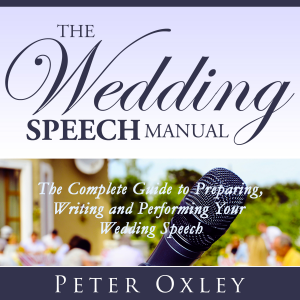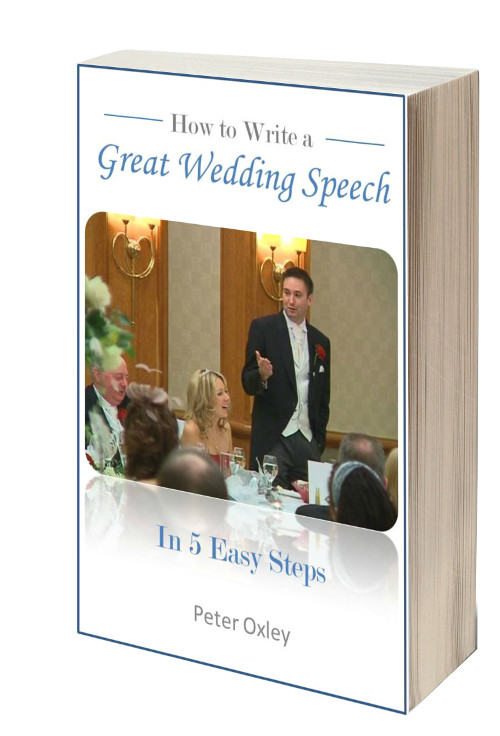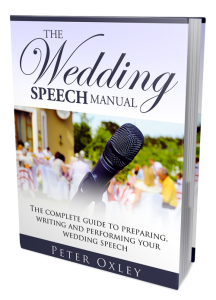The Wedding Speech Guide to Beating Writers’ Block
 Doing a wedding speech can be really daunting: not only when you’re standing up to make the speech, but also much earlier when you sit down to try and write it. It’s a horrible feeling: staring at a blank piece of paper or white computer screen, your head as empty as the page in front of you.
Doing a wedding speech can be really daunting: not only when you’re standing up to make the speech, but also much earlier when you sit down to try and write it. It’s a horrible feeling: staring at a blank piece of paper or white computer screen, your head as empty as the page in front of you.
The dreaded writers’ block can happen to any of us. Even worse, it’s something which feeds on itself: the more you stare at the page and try to force yourself to write, the harder it is to actually get anything down.
So what can you do to beat this and start writing? Here are some tips and suggestions.
Take time out
Sometimes the most effective thing you can do is take some time out, go and do something completely different. As mentioned above, the more you stare at an empty page, the harder it can be to write: the pressure and stress you’re putting on yourself putting yet more obstacles in your way.
So go and do something else: go for a walk, make a cup of coffee, read a newspaper. But whatever you do, make sure you go back to your speech at some point. The reason for taking time out is to clear your head, distance yourself from that feeling of panic, maybe provide you with some inspiration to get you writing. Don’t use it as an excuse to keep putting off writing: it won’t write itself!
Will notes do?
Sometimes people find it hard to get started because they get stuck trying to find the perfect set of words to write down.
If this is you, try to remember that your goal is a speech to be spoken, rather than something to be read. Your speech should reflect the way you speak in normal conversation: otherwise it will sound false and be so much more difficult for you to read and remember.
Try jotting down notes of the key points you want to make, then record yourself talking aloud on the subject, using your notes to prompt you as you go along. When you’re talking, be as natural as you can: imagine that you’re talking to a group of friends, telling them a story. The more you relax into it, the easier you’ll find it. When you’re done, listen back over what you said: you now have the beginnings of your speech.
Just dive in
If you’re stuck because you can’t find that perfect form of words to use, then the answer could be to stop trying to be such a perfectionist. Just dive in: put down whatever comes to mind and don’t worry about whether it’s rubbish or not. You should aim to get as much down on paper as you can as quickly as you can. When you’re finished, then you can edit out the dross and rearrange it so it makes more sense. It’s often easier to rework something than start from scratch.
Use a template
Sometimes it can help to take a template and fill in your own content. Try taking a speech written by someone else (see any specialist wedding speech website) and summarise what they’ve written in a general, non-specific way. For example, you could take any speech and summarise it into something like the following:
- Welcome and introduction
- Opening joke
- Thanks
- How you know the bride/groom
- What you’re going to say
- Story from school
- Story from work days
- Their bad habits
- Their good points
- Toast
Use these as headings and a guide for filling in your speech. Feel free to add or change as you get into your flow, and before you know it you’ll have a load of ideas just waiting to be spoken.
More research required?
If you’re really stuck, in spite of all of the above, you may need to ask yourself whether it’s because you just don’t have enough material. If so, you’ll need to do more research: speak to people, ask them for stories or ideas, trawl the Internet, etc. Sometimes it only takes that one big idea to give you enough to really get started with.
Ask for help
Finally, and most importantly, don’t keep it all to yourself. Wedding speech makers often have a tendency to imagine that they’re all alone with no one to lean on. This needn’t be the case: getting help with your speech isn’t cheating.
If you’re stuck, speak to other people and ask for help: whether it’s ideas, inspiration or a helping hand in finding the right way to write down what you want to say. I promise that you’ll be pleasantly surprised at how helpful people can be, if you only ask them!
Hopefully this gives you enough to help beat the dreaded writers’ block. If all else fails, remember to not get too carried away and stressed by the situation: it’s only a wedding speech, after all!!






